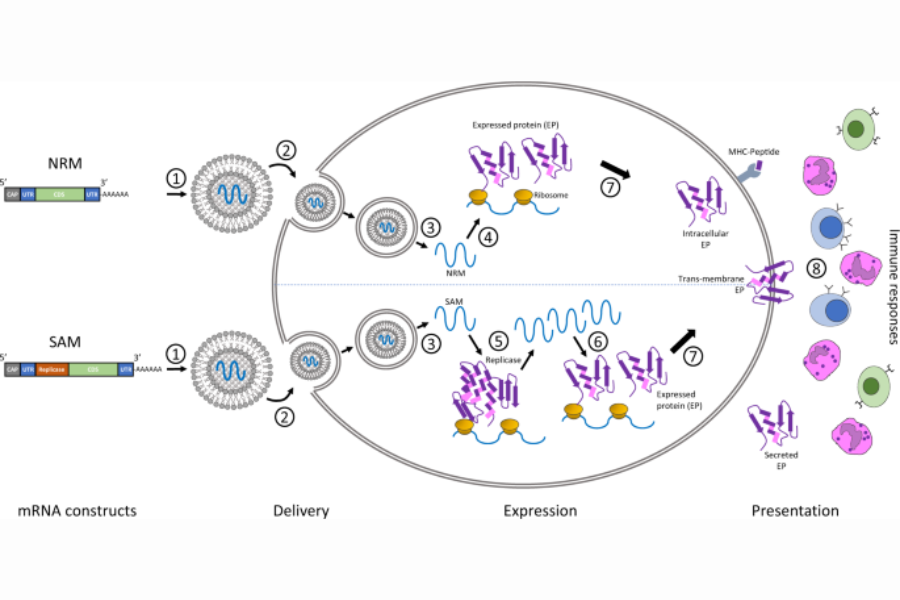Breakthroughs in mRNA Manufacturing: The Future of Biotechnology
Table of Contents
- What is mRNA Technology?
- GMP Standards in mRNA Manufacturing
- Global Impact of mRNA Vaccines
- Future Prospects of mRNA Technology
- Ethical Considerations in Biotechnology
What is mRNA Technology?
mRNA, or messenger RNA, is a crucial molecule in gene expression. It is the intermediary between the genetic instructions encoded in DNA and the cell’s protein-synthesizing machinery. Without mRNA, the instructions from DNA cannot be translated into the proteins that are fundamentally responsible for most life processes. This technology has recently seen immense growth, especially in vaccine development and treatments for diseases that had previously been challenging to address.
The basic idea behind mRNA vaccines is to utilize a small segment of the virus’s mRNA to instruct cells to produce a specific protein that triggers an immune response. Once the immune system recognizes this protein as foreign, it is prepared to combat the virus if it enters the body. This innovative approach has revolutionized the speed and efficiency with which vaccines can be developed, as evidenced by the rapid deployment of COVID-19 vaccines.
GMP Standards in mRNA Manufacturing
Good Manufacturing Practices (GMP) are stringent guidelines that ensure products are consistently produced and controlled according to established quality standards. These practices are critical in industries like pharmaceuticals and biotechnology, where the integrity of the final product can mean the difference between health and harm. Adhering to GMP standards guarantees the product’s quality and safety and ensures regulatory compliance. In mRNA research, GMP manufacturing ensures that each batch of mRNA produced is uniform, high-quality, and free from contaminants that could compromise its efficacy.
In mRNA manufacturing, GMP standards involve rigorous protocols at multiple production stages. This starts with procuring raw materials, which must meet specified purity criteria, and extends to the final testing stages, ensuring the end product meets all necessary safety and efficacy standards. Each step is meticulously documented to provide a clear audit trail, ensuring traceability and accountability throughout manufacturing. More comprehensive information on GMP standards is available through resources provided by the World Health Organization.
Global Impact of mRNA Vaccines
The introduction of mRNA vaccines has transformed global health, particularly during the COVID-19 pandemic. Unlike traditional vaccines, which often rely on weakened or inactivated forms of the virus, mRNA vaccines use a snippet of the virus’s genetic material to instruct cells to produce an antigen specific to the virus. This approach has proven to be a potent and flexible method for generating immune solid responses while significantly reducing the time required for vaccine development.
The most notable example of the efficacy of mRNA vaccines is their use in combating COVID-19. Vaccines like those developed by Pfizer-BioNTech and Moderna have demonstrated high efficacy rates in preventing symptomatic illness while being rapidly adjustable to tackle emerging variants. This success has saved countless lives and provided valuable data that can be applied to future pandemics and other infectious disease outbreaks. The rapid development and deployment of these vaccines have ushered in a new era in vaccinology and provided a robust framework for future innovations. The global impact is a testament to the potential of mRNA technology in addressing urgent public health needs. Detailed insights into the potential of mRNA technology can be found through research provided by the National Institutes of Health.
Future Prospects of mRNA Technology
The future of mRNA technology is filled with promising possibilities that extend far beyond infectious diseases. Researchers are particularly excited about its potential applications in cancer therapy. One promising approach involves using mRNA to encode antigens unique to cancer cells. These mRNA molecules are introduced into the body, where they instruct cells to produce the cancer-specific antigens and stimulate the immune system to attack the cancer cells. This personalized approach could revolutionize cancer treatment by providing a highly targeted and effective way to eradicate tumors.
Beyond cancer, mRNA technology is being explored for its potential to treat genetic disorders. By designing mRNA that can correct the faulty instructions in a patient’s cells, scientists hope to develop therapies that can effectively treat or even cure conditions that currently have no effective treatments. Another exciting area of research is the development of personalized vaccines. These vaccines would be tailored to an individual’s genetic makeup, providing more effective protection against diseases based on the person’s unique immune system.
Advancements in nano-delivery methods, which enable efficient and targeted delivery of mRNA molecules to specific cells, will play a crucial role in realizing these futuristic applications. Improved formulations and delivery systems will likely make mRNA therapies more accessible and practical, paving the way for widespread use in prophylactic and therapeutic contexts.
Ethical Considerations in Biotechnology
While the technological advancements in biotechnology and mRNA technology are undoubtedly exciting, they also bring a host of ethical considerations that must be addressed. Issues such as genetic privacy, informed consent, and the potential for misuse of genetic information are critical concerns that need careful navigation. For instance, genetic data in personalized medicines raises questions about who can access this information and how it is protected.
The balance between innovation and ethical responsibility is crucial for the sustainable development of biotechnology. Public and governmental scrutiny will play a significant role in shaping the ethical landscape. Transparent policies must ensure the fair distribution of mRNA vaccines and therapies across different socio-economic groups, preventing inequalities in access to life-saving treatments.
Moreover, stringent regulations and oversight must be provided to prevent the potential misuse of biotechnology, such as the creation of bioengineered organisms for harmful purposes. Ensuring that ethical standards keep pace with technological advancements will be essential for garnering public trust and fostering an inclusive and equitable biotech revolution.






